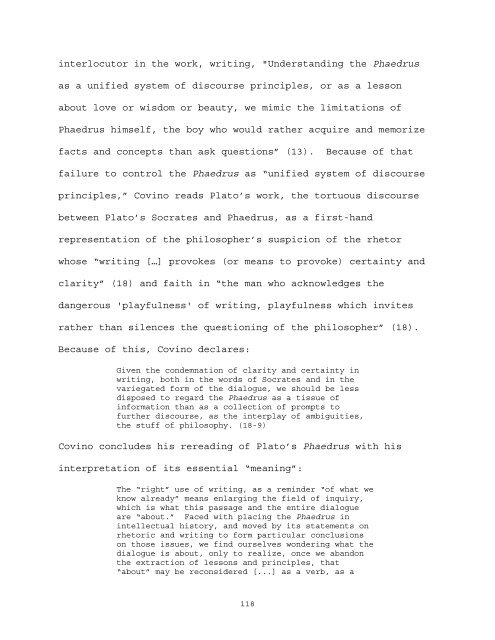Stony Brook University - SUNY Digital Repository
Stony Brook University - SUNY Digital Repository
Stony Brook University - SUNY Digital Repository
You also want an ePaper? Increase the reach of your titles
YUMPU automatically turns print PDFs into web optimized ePapers that Google loves.
interlocutor in the work, writing, "Understanding the Phaedrus<br />
as a unified system of discourse principles, or as a lesson<br />
about love or wisdom or beauty, we mimic the limitations of<br />
Phaedrus himself, the boy who would rather acquire and memorize<br />
facts and concepts than ask questions” (13). Because of that<br />
failure to control the Phaedrus as “unified system of discourse<br />
principles,” Covino reads Plato’s work, the tortuous discourse<br />
between Plato’s Socrates and Phaedrus, as a first-hand<br />
representation of the philosopher’s suspicion of the rhetor<br />
whose “writing […] provokes (or means to provoke) certainty and<br />
clarity” (18) and faith in “the man who acknowledges the<br />
dangerous 'playfulness' of writing, playfulness which invites<br />
rather than silences the questioning of the philosopher” (18).<br />
Because of this, Covino declares:<br />
Given the condemnation of clarity and certainty in<br />
writing, both in the words of Socrates and in the<br />
variegated form of the dialogue, we should be less<br />
disposed to regard the Phaedrus as a tissue of<br />
information than as a collection of prompts to<br />
further discourse, as the interplay of ambiguities,<br />
the stuff of philosophy. (18-9)<br />
Covino concludes his rereading of Plato’s Phaedrus with his<br />
interpretation of its essential “meaning”:<br />
The “right” use of writing, as a reminder “of what we<br />
know already” means enlarging the field of inquiry,<br />
which is what this passage and the entire dialogue<br />
are “about.” Faced with placing the Phaedrus in<br />
intellectual history, and moved by its statements on<br />
rhetoric and writing to form particular conclusions<br />
on those issues, we find ourselves wondering what the<br />
dialogue is about, only to realize, once we abandon<br />
the extraction of lessons and principles, that<br />
“about” may be reconsidered [...] as a verb, as a<br />
118
















